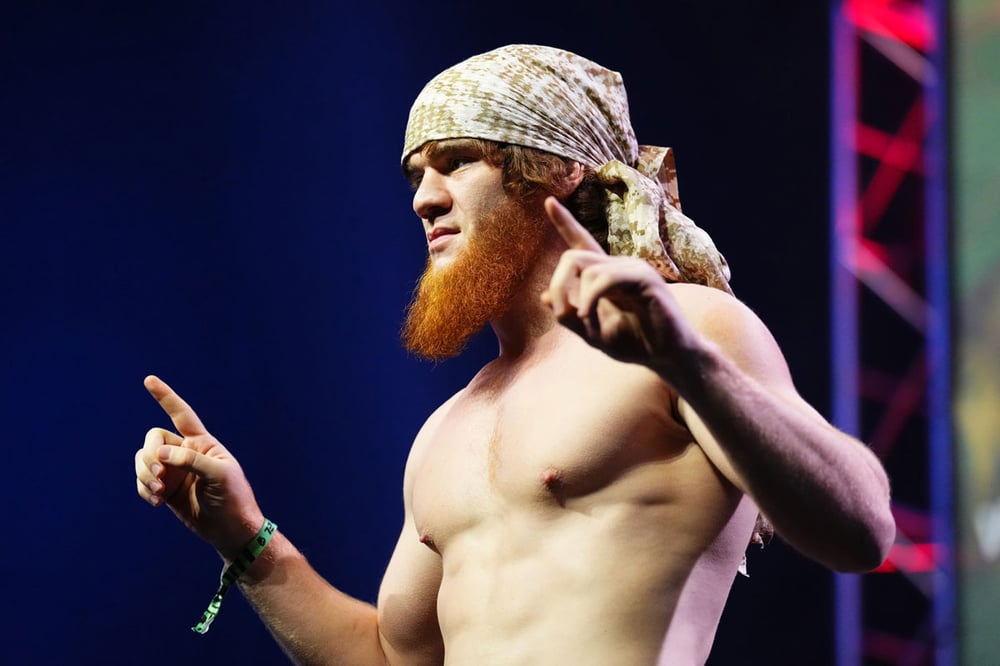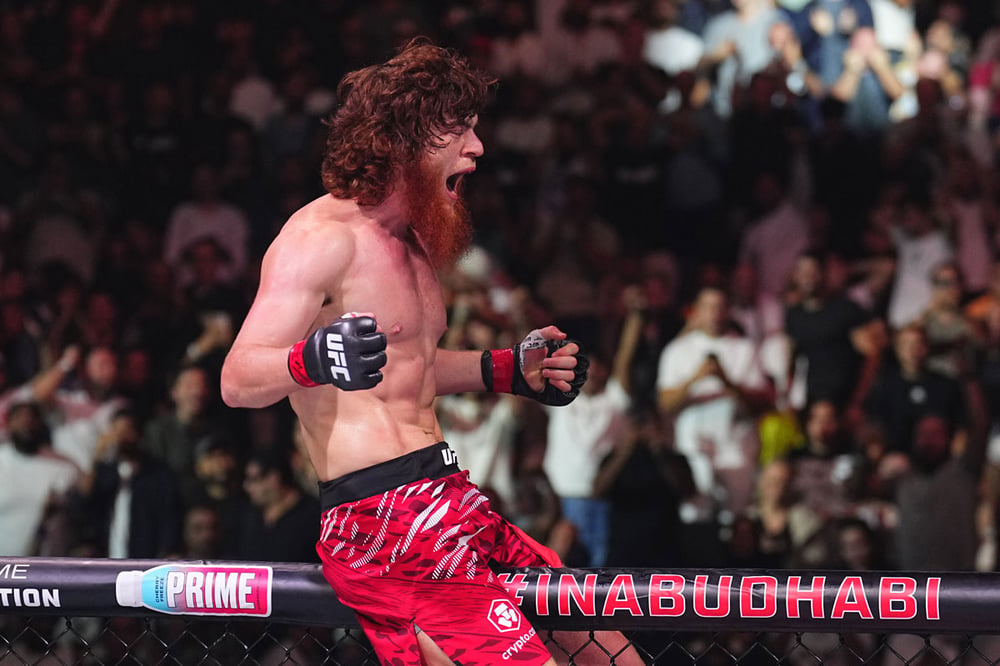
Issue 211
December 2024
Ray Klerck gives you the exclusive Shara Bullet interview you won’t see anywhere else.
Sharabutdin Magomedov is unlike any fighter we’ve seen. With his unorthodox striking, precision, and relentless adaptability, you never know what you’ll get. Known as ‘Shara Bullet,’ the Dagestani has a reputation for combining video game-inspired creativity with the ferocity of traditional martial arts. Not as villainous as you might expect, he thrives on unpredictability, so Fighters Only’s Ray Klerck sat down to explore the origins of his unique approach, the challenges of staying undefeated, and his vision for the future of MMA.
Your fighting style is one of the most unique in the UFC. What’s the origin of your love for kicks and unorthodox techniques?
In my early childhood, my style began to take shape when we watched various fascinating martial arts movies. Motivated by these films, we started bringing what we saw to life, sometimes trying it out on the streets. We also played video games like Tekken and Mortal Kombat, where you could experiment with a wide range of moves. It made me want to replicate those moves in real life. I’ve practiced many techniques during training and am ready to bring them to reality, much like in Tekken, where you can expect new surprises from me.
You’ve called Lethwei the toughest combat sport. What was your first experience like, and how did it shape your approach to other martial arts?
I called Lethwei the most brutal form of sport, likely because it has almost no rules. I’ve competed in many different martial arts, and some of them limited me in certain moves. That’s why I wanted to grow and expand my skill set. This also led me to take up Muay Thai, as kickboxing felt easier compared to Muay Thai.
Muay Thai is a tougher sport, but I consider Lethwei the most brutal because there are virtually no restrictions—you can even strike with your head. With experience, you start to realize that wasting unnecessary energy can cost you the victory. Endurance is a crucial quality in a fight. When you see that your signature, powerful move isn’t landing, despite pouring your energy and strength into it, you understand the need to adapt. At the end of such a move, you have to absorb the energy, release the tension in your muscles, and conserve power while maintaining balance and precision. This allows you to stay sharp without expending too much energy.

With such a heavy kicking game, how do you ensure your balance and defense are ready when a strike doesn’t land?
I think this ability to adapt and refine strikes mid-movement is a key aspect of my approach. Yes, the variety of techniques and the ability to switch stances define my style.
Switching stances so frequently is unusual in MMA. What advantage does it give you against opponents, and is it something you work on daily?
What I love to do, and what I demonstrate in fights, is using different stances, varying strikes, and adapting to different circumstances with unique approaches to each bout. Each stance brings its own dynamic to the fight, offering a completely distinct strategy for engagement. I enjoy the diversity within the fight itself. Switching stances allows me to maximize my style and gives me an edge over my opponent. It makes it difficult for them to develop a tactical approach against me because they’re constantly forced to recalibrate their focus. This shift disrupts the fight’s rhythm and counters whatever preparation they’ve made.
You’ve mentioned wanting a fight with Michael ‘Venom’ Page. What makes him an ideal opponent for you?
The fight with Michael "Venom" Page is the perfect matchup from a media perspective. It’s an ideal fight for me and a chance to showcase my abilities to the world. Page is a highly popular fighter and a former Bellator champion. Such matchups excite me, fueling the motivation to push myself further and refine my skills. To give the audience what they come to the stadium for, what they turn on their TVs for—that’s the goal. A fight with Page is one that will be on a cosmic level. I’m certain sparks will fly in this bout.
How has your partial vision loss influenced your fight preparation and perception of range?
For any fighter, any athlete, injuries are a challenge to overcome. Many injuries actually make you stronger. Of course, every injury brings its own difficulties, but for me, nothing has changed. The path to the goal remains the same: to move forward and claim my gold. Ahead lies the ultimate treasure—the UFC championship belt.
You’ve competed in various martial arts—Muay Thai, Lethwei, and now MMA. Which sport do you feel most represents who you are as a fighter?
The sport that best reflects who I am is undoubtedly MMA. It’s a blend of all martial arts, full of diversity, and with the fewest restrictions. That’s why it’s my favorite sport.
You’ve described a fight as a party. What’s the vibe like in your mind before you enter the Octagon?
To prove that you’re ready to become a champion and face the toughest opponents. I’ve said in interviews before that every fight feels like a celebration to me. The fight itself gives you emotions, adrenaline—a true sense of festivity. In the end, you do it all to have your hand raised and to fulfill not only yourself but also the expectations of your loved ones. The responsibility comes with its challenges, but the faith of those close to you gives you strength. You move forward without looking back, solely focused on victory. Before stepping into the octagon, my thoughts are often simple: it’s just another day at work. I just need to step in, take over, win, collect my acorns, and head home happily to my family. Nothing else crosses my mind.
Before stepping into the octagon, my thoughts are entirely focused on the fight, on pulling myself together, and on showing the world that the past three months of preparation weren’t for nothing.

Do you feel responsible for carrying on the Dagestani legacy in the UFC?
Russian and Dagestani fighters, in particular, have delivered spectacular performances in the UFC. I want to add my own flavor to that brilliance with my fights, my stances—what people love to see. My mission is to showcase the diversity of Dagestani striking techniques and elevate its reputation.
What’s the biggest misconception people have about you as a fighter?
Wrestling has already been seen by everyone. It’s time for striking. I’ll be showcasing it in every fight. Of course, I feel the responsibility of representing all of Dagestan. That’s what makes our sport so fascinating—no one can truly predict what you’re capable of. Everyone can speculate, and even martial arts fans might think you excel at something when, in reality, you might not. On the flip side, every fight is something new for me. With every bout, I know I’m growing.
What’s the story behind your nickname?
Bullet is my nickname. The origin of ‘Shara Bullet’ probably comes from when I registered on Instagram and made ‘Shara Bullet’ my handle. Before that, I used to call myself ‘Shara Pulya.’ When you translate pulya from Russian to English, you get bullet, and that’s how the nickname stuck—Shara Bullet.
Growing up, were there any fighters or athletes who inspired you, or did you find inspiration elsewhere?
As a child, my inspiration in martial arts came from movies. Films featuring Jean-Claude Van Damme, Jackie Chan, and Bruce Lee were what sparked my passion. Movies like Mortal Kombat were a big source of inspiration for me, along with gaming consoles. Then came the birth of MMA and the emergence of the UFC, which glued me to the screen. Fights became the most fascinating thing I’d ever watched, and that’s how I got drawn into this form of martial arts.
What do you enjoy doing outside of fighting? Any hobbies or interests that might surprise your fans?
As for hobbies outside of fighting, there isn’t much time left for anything specific these days. I try to spend as much time as possible with friends, family, and my kids. My life revolves around sports and fighting. But when I do get free time, my hobbies include hanging out with friends, playing Game of Thrones or football, or enjoying some active outdoor activities in nature—those are my favorite moments.
You’ve been described as a “bad boy” in the MMA world. How do you feel about that label—do you embrace it or feel it’s misunderstood?
Many martial arts fans see fighters as beasts or villains of a sort. Some might see me as a bad guy, and they’re not wrong. Because the moment that cage door closes, I become the baddest guy in the octagon. What people think about me outside the octagon—what kind of person I am—well, they’re free to think whatever they want. Some people like bad guys, others prefer good ones.
Where do you see yourself in five years? Do you have any personal goals outside of fighting that you’re working toward?
In five years, I see myself nearing the end of my career in this sport. By then, I’ll start reaping the rewards of what I’ve sown in MMA. My priority will be to help my loved ones, my people, and my country—to give back and bring benefit to them. I believe that will be my most important mission.
Does your diet incorporate traditional foods from your region?
As for fighters, everyone has their own supplements or “potions” that give them strength. In our Dagestani diet, one of the key staples is urbech—a paste made from various types of nuts. It gives us a lot of energy, especially when we eat it with bread (tachak). That’s probably our secret weapon. Beyond that, most of the diet remains quite strict, as certain foods are off-limits.
Being undefeated can bring its own set of expectations and pressures. How do you manage the weight of staying unbeaten?
I don’t have the mindset that something is holding me back or that I can’t deal with certain obstacles. I’ve always fought, always felt like a winner in my bouts. I know I can compete with and defeat the best fighters in the world. That’s where my fearlessness lies—the absence of fear to lose or retreat.
In the fights I’ve been part of, I believe I won. Even in those where the decision didn’t go my way, I feel it was because the judges weren’t on my side that day. They disappointed me by awarding the victory to an undeserving opponent. But in my heart, I consider myself the winner in all my fights.
Each fight carries the weight of responsibility—not just for myself but for my loved ones, my team, my homeland, my country, and the fans around the world who support me. Regardless of whether you’ve lost or remain undefeated, that weight is always on your shoulders. Every victory feels like the last one, and there’s no room to dwell on defeat. A warrior never steps into battle thinking about failure. You have to go in ready to win at all costs, leaving everything else behind.










